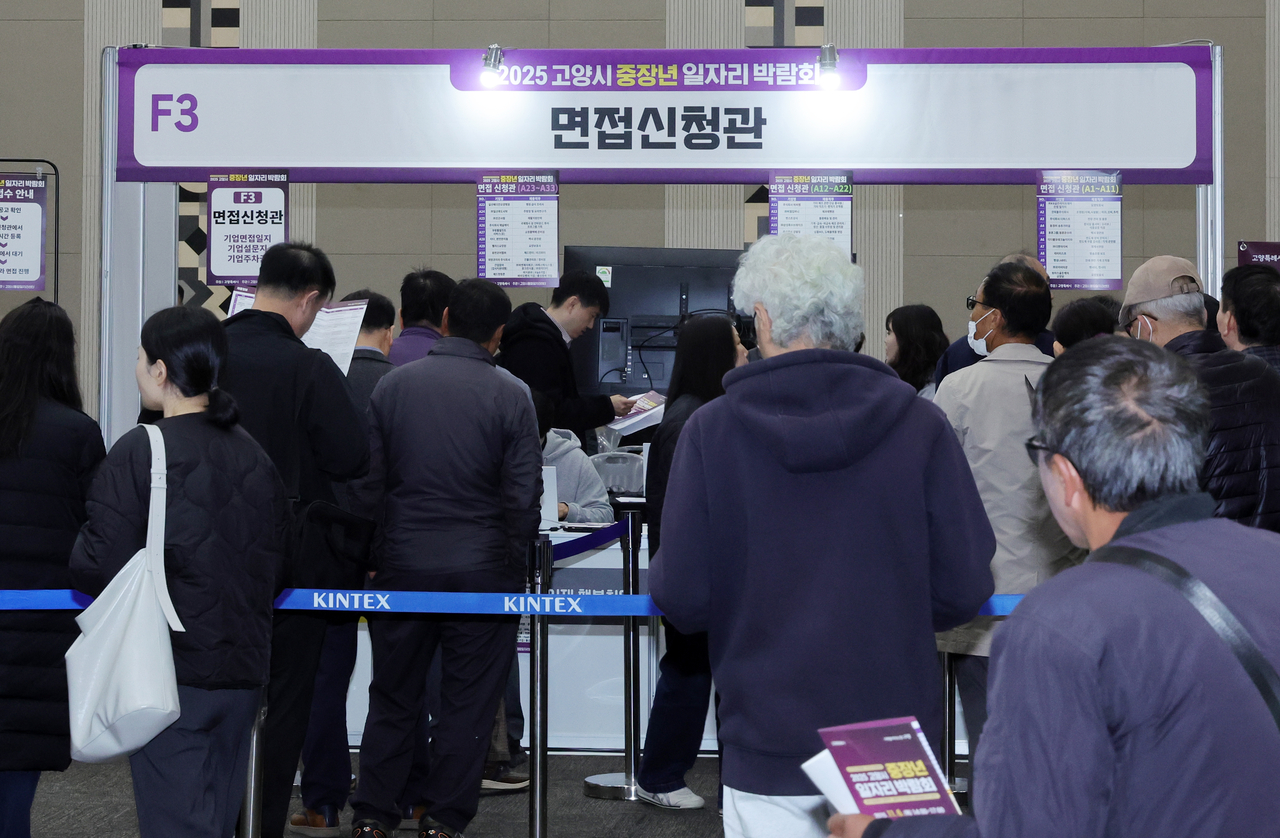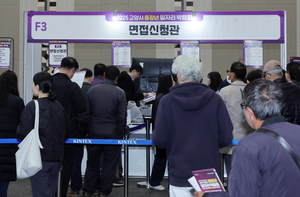Plans to extend senior employment could bridge pension gaps, but risk higher costs for businesses and fewer jobs for the young
 Job seekers wait for interviews at a job fair for middle-aged and senior workers at KINTEX in Goyang, Gyeonggi Province on Nov. 6. (Yonhap)
Job seekers wait for interviews at a job fair for middle-aged and senior workers at KINTEX in Goyang, Gyeonggi Province on Nov. 6. (Yonhap)
As South Korea’s ruling Democratic Party of Korea steps up to raise the statutory retirement age from 60 to 65, debate is intensifying over how the move could reshape the nation’s labor market, with the business community warning of higher costs and shrinking job prospects for young workers.
Raising the retirement age to 65 was one of President Lee Jae Myung’s key campaign pledges, aimed at addressing Korea’s rapidly aging population and delayed pension payouts. The Democratic Party has vowed to introduce detailed legislation before the year’s end, but the wide gap between the labor and business positions appears to make its swift passage uncertain.
The initiative picked up steam following the party’s formal launch of a special committee on a retirement age extension on Nov. 3, initiating discussions among representatives from the country’s two umbrella unions, the Korea Confederation of Trade Unions and the Federation of Korean Trade Unions, and the Korea Enterprises Federation, a business lobby, to align their positions on the proposed law.
Multiple bills proposing a phased extension are already on the table, including one by Rep. Park Hong-bae of the Democratic Party, seeking to gradually increase the statutory retirement age to 63 by 2027, 64 by 2032 and 65 from 2033, in line with national pension eligibility, which by then will also reach 65.
Superaging population, shrinking workforce
Labor advocates argue that raising the retirement age is essential in a rapidly aging society, as the current gap between retirement and pension eligibility threatens the livelihood of older Koreans.
South Korea’s current retirement age is 60, extended to all workplaces in 2017. But the national pension system does not pay benefits until age 63 for those born between 1964 and 1973 — the so-called second baby boom generation. By 2033, the pension payout age is set to rise to 65. This three-to-five-year gap leaves many retirees without stable income, forcing them into low-paid or irregular jobs, advocates say.
Unions argue that extending the retirement age to 65 would bridge that gap, providing steady income until pensions begin and helping reduce old-age poverty, of which Korea has the highest rate among OECD nations.
Yang Kyung-su, head of the KCTU, emphasized that the retirement age extension is critical to tackling old-age poverty. “Even if the birthrate rebounds today, the working-age population will inevitably continue to decline over the next 20 years,” he said during a meeting with Jung Chung-rae, head of the Democratic Party of Korea. “We need policies that can alleviate old-age poverty through extending the retirement age and give young people hope by creating more quality jobs.”
Kim Dong-myeong, head of the FKTU, echoed the view, saying “extending the retirement age is a very reasonable demand to prevent people from falling into poverty in old age.”
As Korea’s baby boomers begin to retire, the matter has become increasingly pressing. This group represents nearly one fifth of the nation’s population at approximately 9.54 million people, meaning their departure from the labor market could have considerable economic implications.
Adding to the challenge, Korea maintains the world’s lowest fertility rate of 0.75, while those aged 65 and older now account for over 20 percent of the population, officially making it a “superaged” society. Meanwhile, the working-age demographic — aged 15-64 — peaked at 37.6 million in 2019 and is on track to shrink below 30 million by 2040, according to Statistics Korea.
Businesses warn of higher costs and fewer jobs for youth
Business groups, however, argue that extending the employment age without structural reforms to the labor market, including seniority-based pay systems, would raise personnel costs for companies and crowd out younger workers.
According to a report by the Federation of Korean Industries, extending the retirement age from 60 to 65 could result in additional labor costs of around 30.2 trillion won ($20.6 billion) per year for local businesses by adding 590,433 regular employees aged 60 to 64.
This is roughly equivalent to hiring about 902,000 workers aged 25 to 29, it noted.
The Bank of Korea has also warned that youth employment would bear the brunt. In an April report, it projected that for every senior worker who is retained, between 0.4 and 1.5 younger workers could be displaced. A one-year retirement delay would theoretically eliminate 50,000 regular jobs for youth.
“Extending the retirement age alone, without addressing seniority-based wage systems and rigid employment structures, could lead to unintended side effects, including further declines in youth employment,” it said.
Instead of raising the legal retirement age, the business community has called for a measured approach, such as a rehiring system, where workers retire at 60 and then sign new short-term contracts.
“Only if senior employment is expanded through a rehiring system of ending existing employment contracts and signing new ones can we mitigate negative effects on youth employment,” the KEF said in a statement, proposing a special law to promote reemployment of senior workers.
The business lobby also warned that a blanket retirement age extension would mainly benefit regular employees in large corporations and the public sector — the same segments of the job market most favored by younger workers — potentially aggravating intergenerational conflict.
sahn@heraldcorp.com
